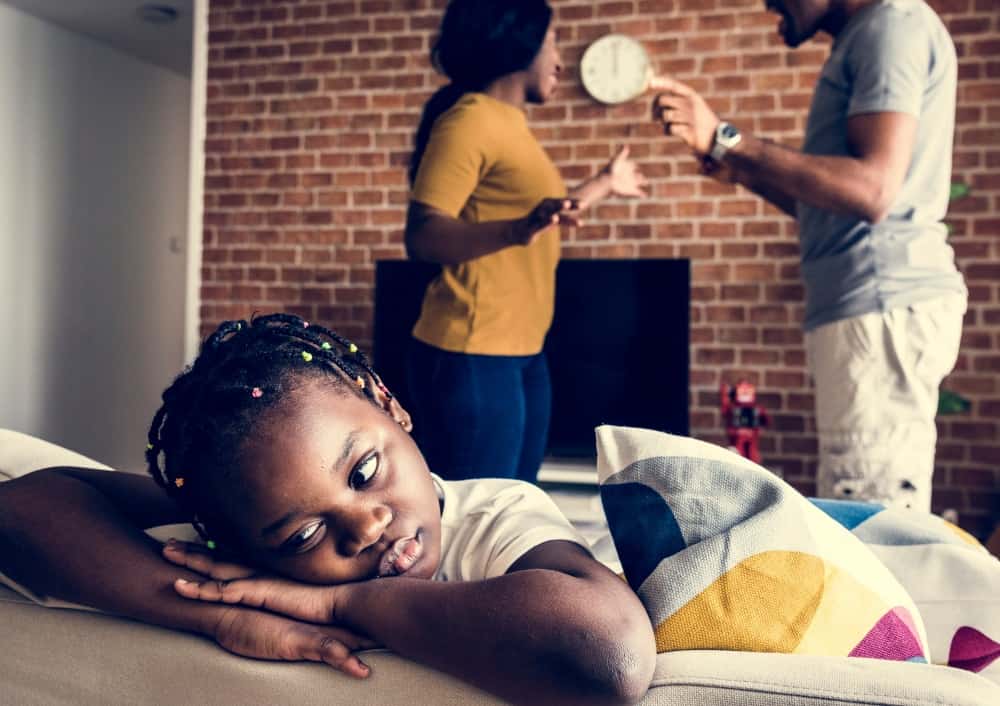Imagine this… You’re walking through the grocery store and hear a child in the next aisle screaming and throwing items on the floor. Concerned, you head over and notice that a young child has thrown himself on the floor (along with half the shelf of candy).
He’s yelling through his tears, “I’m not leaving until you buy that for me!” His exasperated parent is standing close by.
Or, how about this? Your teenager has begun to push the limits of your house rules by sneaking out, lying about where she is going, and refusing to abide by curfew.
She says disrespectful things to you and the rest of the family, is irritable and moody all the time, and generally disrupts the household, both by breaking the rules and aggressively yelling and screaming every time you try to regain some semblance of control.
Do either of these situations sound familiar?
This article will help you to understand why kids begin to express defiance in the first place and how to decipher between typical behaviors and more severe behaviors that may require assistance from professionals.
Table of Contents
When Your Kids Use The Word “No” Against You
One of the most common first words for a baby to utter is one that will haunt parents throughout the rest of their lives: the word NO. As soon as kids begin to understand what “no” means, they will use it whenever they can, and it’s normal, and even a good sign in their development of independence!
With the development of language, young children’s brains are designed to help them understand how words connect with the world around them, and how words can get them what they want. “No” is a powerful word learned early on and has a lot of significance and meaning to parents, mostly because parents use it frequently themselves.
It’s a great word to establish boundary setting, rules and regulations, and to help kids understand what is expected of them. It’s also a word that helps them to set their own boundaries and limits when used appropriately.
But what about when they try to use it against you?
What’s Normal and What’s Not
Defiance — the “bold resistance[1] to compliance or general lack of obedience to parents — is a very common behavior in children that develops as soon as they begin to learn how to express themselves.
I have found, through both my study of the brain and my work with this population, that this makes sense from a biological standpoint; as soon as children learn how to speak for themselves, their goal is to learn how to differentiate themselves from their parents and begin to see the world as a unique and individual person.
We all want our children to gain independence.
The problem that comes with this amazing time in development is that their little brains don’t always want to do what’s best for them. More often than not, it’s quite the opposite.
So, while it’s a wonderful milestone for children to become little people with their own thoughts and feelings, it can definitely be exhausting and overwhelming when their independence and inability to follow directions impacts your everyday life.
Some defiance is typical, but when is defiance MORE than just asserting individuality and when should parents seek help?

Typical Child Defiant Behavior, Ages 2-10
The following behaviors would be considered developmentally appropriate for young children (2-10):
- Using the word “no” when asked to do something.
- Crying, whining, or tantrum behavior when asked to comply with a request.
- Asking “why,” trying to negotiate for more time or seeking ways out of doing what has been asked.
- Angry reactions such as stomping feet, making angry faces, ignoring parent requests, throwing toys/objects toward the ground in defiance.
- Running away or trying to avoid conflict by pretending like they didn’t hear the request.
- Dawdling and not fully participating in an effort to have parents complete the request for them.
- Moodiness and irritability that comes and goes based on environment and triggers (usually due to being asked to engage in non-preferred activities like brushing teeth, taking a bath, etc.).
Note: While these are considered typical patterns of behavior in children, using the tips in the “How Can I Help My Child?” section below can help to alleviate these defiant behaviors!
Child Defiant Behavior That May Require Professional Assistance, Ages 2-10
The following behaviors begin to become more extreme and may call for you to speak with a professional regarding how to manage some of these behaviors to see improvement[2]
- Regular and consistent pattern of irritability and difficulty managing angry outbursts and moodiness.
- This is usually seen with and without triggers or exposure to non-preferred activities. I’ve had parents explain that their children “wake up aggressively angry” without a foreseeable reason and this continues throughout the day, most days.
- The defiance is more rigid and extreme
- They generally exhibit stubbornness and an unwillingness to comply, no matter what the consequence may be.
- Frequent non-compliance of most things throughout a day
- They may never listen the first time and may require multiple prompts for everything that is asked of them.
- Aggressive or disrespectful physical behavior and language with all others, including adults.
- Any aggressive behaviors toward others (hitting, kicking, spitting, throwing toys at people, etc.). This also involves destruction of toys or property.
- Language can be hurtful, mean, or cutting, or occasionally can be a slew of curse words directed at whoever is upsetting them at that time. Common phrases used are: “You’re the worst mommy/daddy in the world! I wish I didn’t even have a mommy or daddy”, “I hate you!” or “I hate my life”.
- Going out of their way to do the opposite of what was asked or to spend effort appearing to vindictively annoy, frustrate, or irritate those around them.
- This could be an “I’m not touching you!” kind of behavior with a sibling, or anything else that could cause a lot of irritation for siblings, peers, or caregivers.
- Blaming others for things that they themselves have done.
- This happens a lot with siblings and can be hard for parents to know who has done what, especially if it happened in another room.
- Being very sensitive and emotional and experiencing difficulty with regulating or tolerating emotions.
- These kids will be self-deprecating at times, seem to struggle with frustration tolerance, and may constantly say things about how “bad” they are or expressing other difficulties with self concept or self-esteem.
**Note: If you are noticing or experiencing these symptoms with your child, it is recommended that you seek out assistance from a mental health professional to help decrease defiant behaviors.

Normal Defiant Behavior in Teenagers, Ages 10-18
The following is a list of normal defiant behaviors for older children and teenagers (10-18):
- Attempting to establish independence, becoming more private, not sharing as much with parents.
- Questioning long-established rules and regulations in the household and trying to debate parents on whether or not these should change.
- Being upset about the response from parents, but eventually understanding that parents are in charge and that they must follow through with parent rules, even if it’s not what they like.
- Anger, mild yelling, slamming doors, and general irritable mood and talking back to parents.
** Note: Similar to the child section below, any parent can use the tips in the “How Can I Help My Child?” section below to help improve their child’s ability to comply.
Teenage Defiant Behavior That May Require Professional Assistance, Ages 10-18
The following is a list of behavior cues that you and your child may need assistance from a professional[3]
- Extremely short tempered and angered outbursts with very small or unseen triggers.
- Engages in consistent and chronic defiance, refusing to follow the rules, and deliberately disobeying those in charge.
- Vindictive, spiteful, and disrespectful language toward others and doing harmful things to others just to “get back at them.”
- Aggressive (both physical and verbal) behavior with adults and peers/siblings.
- In more severe situations, a teen (or even sometimes a child) may meet the criteria for a conduct disorder. According to the Diagnostic and Statistical Manual of Mental Disorders, a child may have a diagnosable conduct disorder if he/she has the following behaviors for at least 6 months[4]:
- Aggression to people and animals
- Destruction of property
- Deceitfulness or theft
- Serious violations of rules and laws
**Note: If you are noticing or experiencing these symptoms with your child, it is recommended that you seek out assistance from a mental health professional to help decrease defiant behaviors.
What Conditions May Cause Extreme Defiance?
There are many different mental health conditions that can increase defiance in children.
1. Anxiety
Anxiety and all of the disorders that are connected to it (OCD, phobias, social anxiety, selective mutism, etc.), can present with defiant behavior. Kids who are anxious are struggling with feeling a lack of control of their surroundings and try to obtain that control forcefully in an effort to feel less helpless.
Related article: The Signs of Anxiety: Could Anxiety Be Wrecking Havoc On Your Life?
2. Learning disorders and other processing difficulties
Visual or auditory processing issues, sensory integration issues, and autism spectrum disorders can also increase defiant behaviors. Kids who do not know how to express themselves or are experiencing difficulty regulating their bodies have a much harder time exhibiting appropriate frustration tolerance.
Related Article: Autism Spectrum Disorder Guide
Related Article: How Kids With Autism Spectrum Disorder Learn and Think
3. Depression
Depression is another common disorder where defiance can originate. Low self-worth and confidence can contribute to children feeling the need to put themselves in a cycle of self-fulfilling prophecy, where they feel so bad about themselves that they exhibit negative behaviors to confirm their suspicions that they are a bad kid who can’t do anything right.
Related Article: Guide to Depression in Children and Teens
4. Attention-Deficit Hyperactivity Disorder (ADHD)
ADHD is a common condition that is associated with defiance, due to the impulsivity that children with this diagnosis exhibit and their difficulties with attending to tasks and following through immediately.
Related Article: The Psychological Effects of ADHD
Related Article: ADHD: What You Need to Know
5. Oppositional Defiant Disorder (ODD)
Overall, while all the above conditions can contribute to defiant behaviors, there is a mental health diagnosis that covers all the behaviors: Oppositional Defiant Disorder, or ODD. ODD is widely understood as a diagnosis to provide assistance for parents who are experiencing these difficulties with their kids. However, this diagnosis has a lot of backlash because of its interconnectedness to many of other concrete conditions.
Related Article: Your Guide to Oppositional Defiant Disorder (ODD)
What Else Can Cause Defiant Behaviors?

There are many things that can cause children to act out and exhibit defiant behavior, outside of specific mental health conditions. Often, as mentioned above, if a child is feeling unhappy, helpless, and hopeless, with low self-worth, they can exhibit the moodiness and behaviors that are interpreted as defiance.
These negative feelings can arise from a variety of situations, but some common examples include:
1. Family Dysfunction
Children who live in high-conflict homes may experience emotional dysregulation that can present externally. This is common when kids feel helpless about the familial struggles they are either witnessing or experiencing at home, and can often be an attempt to make themselves feel stronger and confident by standing up for themselves.
2. Peer Problems
Difficulties with fitting into social groups, conflict with peers such as bullying, or general feelings of being left out can also affect a child’s self-worth and cause them to exhibit some of the moodiness and difficulty regulating emotions that we see in kids who struggle with defiant behaviors.
3. Medical Concerns
While much less common, it is possible that some children may have a medical condition that could be impacting their ability to regulate their emotions. Occasionally, children experience neurological impairments or other medical diagnoses that can account for changes in mood and the inability to manage their frustration tolerance.
How Do I Help My Child?

No matter whether your child is experiencing the developmentally appropriate version of child defiance or the more severe side of these behaviors, you can help your child improve their ability to comply and develop long-term listening and compliance skills. Here are some of the best strategies for improving compliance with defiant children:
1. Focus on the conflict and triggers
Recognize what are major triggers for your child and preemptively work to address problems before they arise. This may mean offering more time for transitions and having clear expectations about time and consequences for lack of follow through.[5, 4]
2. Use positively stated, direct instructions
Telling a child to “stop jumping on the couch” does not tell that child what you want them to be doing, it tells them what you don’t want them to be doing. Instead, say something like, “Please keep your feet on the floor.”
This gives them something to comply to and doesn’t leave room for another undesirable behavior to replace the original one.[5]
3. Spend more time describing and praising your child’s good behavior
Often, defiant kids get into a cycle with parents where they only hear about their negative behavior and everything they’re doing wrong.
Flipping this and spending more time on their positives can help with self-esteem and willingness to comply. It can also help you see that your child does a lot of good things throughout the day that you may be missing.[5]
4. Selective attention
Ignore behaviors that are irritating or unnerving, but aren’t aggressive or destructive, to decrease the reinforcement they get for participating in it. Instead, wait until they are demonstrating appropriate behavior praise them for that.
This will help to decrease the attention they get for the negative behavior and increase attention earned for positive behavior.[5]
5. Two-Choices
To avoid power struggles, provide two choices of things acceptable to you and allow your child to make the ultimate choice. For example, if your child is refusing to eat a particular food you’ve provided, you can give two options and say something like, “Okay. You can choose to eat the broccoli or the spinach. Which one do you want?” That allows them to feel a sense of control but also secures compliance of what you want or need them to do.[5]
6. Follow-through
When giving consequences it is important to always follow through with what you say if your child doesn’t comply. Kids learn that parents give up or give in very easily which perpetuates the defiance.
7. Support
If your child is experiencing other mental health issues, seeing a professional to address those is also important.
What Can I Expect in the Future?

If your child is on the more severe end of these behaviors, seeking professional help to problem-solve ways to improve behavior will be important to support and assist you with redirecting defiance into more appropriate outlets of frustration tolerance.
Implementing the suggestions above can improve these things on their own, but troubleshooting with a professional is the best way to get strategies that are tailored to your child, spurring quicker improvement than if you try to tackle it on your own.
All in all, defiant behaviors can be stressful for parents to deal with, but know that there are solutions and having someone on your team to help with his can ultimately change your relationship with your child for the better.
What to Expect When Seeking Help
Mental health professionals are experts at helping families deal with defiant children, working on problem-solving and even eradicating some defiance before it increases in severity.
What is often suggested is working with a family therapist to work through some of the dysfunction and frustration in the family system, increasing communication with one another in a healthy way.
A therapist can also help parents set firm and appropriate boundaries with their children in addition to learning to express the positives about their family and the dynamics that are working, as well.
Sometimes, therapy would be supplemented by medication support provided by a psychiatrist who would address any possible biological or neurological difficulties with emotional regulation. Mental health professionals help find the right fit for the needs of your family and recommend resources that can truly improve your family’s quality of life.
References
-
- Defiance. (n.d.). Retrieved November 18, 2018,
- American Psychiatric Association. (2013). Oppositional Defiant Disorder. In Diagnostic and statistical manual of mental disorders (5th ed.). Washington, DC
- American Psychiatric Association. (2013). Conduct Disorder. In Diagnostic and statistical manual of mental disorders (5th ed.). Washington, DC
- Sexton, T. L. (2009). Functional family therapy: An evidence-based clinical model for working with troubled adolescents and their families. London: Routledge.
- McNeil, C. B., & Hembree-Kigin, T. L. (2011). Parent-child interaction therapy. London: Springer.







